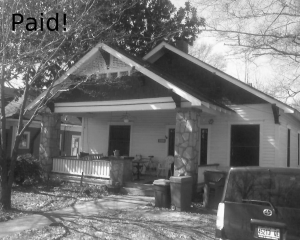
I had to visit a broker. We had to hand over cash, or a check. We were mailed a stock certificate. Stocks were mostly a game for professionals. If you held stocks it was through a mutual fund, run by professionals, the money deducted from your paycheck.
The easier way to put money to work was to buy a CD from the bank. This is a loan to the bank, with a fixed income stream. I’m not old enough to have clipped coupons, but I know people who did, and it was a real thing.
Today, stocks are the most liquid investment you can have. Buying and selling is as easy as going online. Trading is free. You always know the price you’ll pay or the price you’ll get.
It’s bonds that look dicey. While you can get them, the pricing is very confusing. The point is that if you want action on something, the best price when you buy and when you sell, you make it liquid.
My House

But houses aren’t supposed to be liquid. They’re where you live. They’re your stake in the community. Renters, organized as YIMBYs (Yes In My BackYard), front for developers by demanding more housing (a cause with which I sympathize). But it’s not their backyard. If you don’t own something there, it’s the developer’s backyard, the real estate industry’s backyard.
There are ways to improve things. We should build more houses. We need to turn office buildings into apartments and build more small apartments. But it’s even more important to make houses liquid, streamlining contracts, lowering commissions, standardizing things. We can also change tax laws to make it cheaper to buy for living and more expensive to hold for rental.
The housing crisis, in other words, is artificial. We solve it by making our housing stock more like, well, stock, and by regulating the market so those who live in houses have the market advantage.










